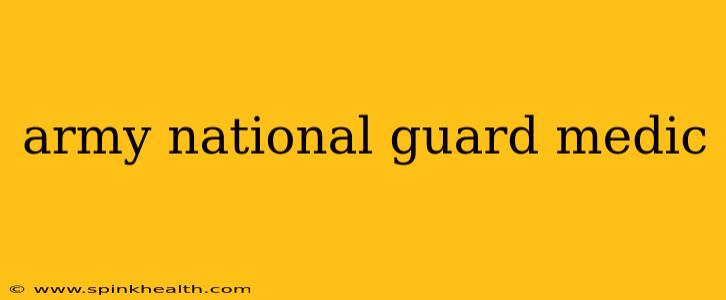The siren's wail cuts through the quiet of a Saturday morning. It's not an emergency call for a local ambulance service; this is a different kind of response. For Sergeant Emily Carter, it's the sound of duty calling. Emily isn't just a medic; she's an Army National Guard medic, a citizen soldier balancing a civilian life with the demanding role of providing medical care in times of crisis – both at home and abroad.
This isn't a Hollywood portrayal; this is the reality of a vital role within the National Guard. Emily's story, and the stories of countless others like her, reveal the dedication, skill, and unwavering commitment it takes to serve as an Army National Guard medic.
What Does an Army National Guard Medic Do?
This question often arises, and the answer is multifaceted. An Army National Guard medic's responsibilities are diverse and depend heavily on their unit's mission and the specific situation they face. Their roles extend far beyond simply administering first aid.
They are the first line of defense in emergency situations, providing crucial medical care in challenging environments. From battlefield trauma to natural disasters, their skills are invaluable. Their training enables them to perform a wide range of tasks including:
- Providing advanced medical care: This includes administering intravenous fluids, managing airways, and treating traumatic injuries.
- Performing triage: In mass casualty events, they swiftly assess patients to prioritize care based on the severity of their injuries.
- Providing preventative medicine: This includes administering vaccinations, educating soldiers on health and hygiene, and conducting health assessments.
- Working in a team: They are part of a larger medical team, coordinating with other medics, nurses, and physicians to ensure effective patient care.
- Responding to emergencies: This could be a natural disaster, a large-scale accident, or a civil disturbance where their skills are essential.
What is the Training Like for an Army National Guard Medic?
Becoming an Army National Guard medic is not a walk in the park. The training is rigorous and demanding, designed to equip soldiers with the skills and knowledge necessary to handle any medical emergency they might encounter. It involves a combination of classroom instruction, hands-on training, and field exercises.
Expect intensive courses covering:
- Combat lifesaver skills: These are crucial for providing immediate medical care in combat situations.
- Advanced medical techniques: This involves learning about advanced wound care, intravenous therapy, and administering medications.
- Emergency medical services (EMS): Training in EMS techniques is also a significant part of their development.
- Tactical combat casualty care (TCCC): This specialized training teaches medics how to provide medical care in a combat environment.
How Long Does it Take to Become an Army National Guard Medic?
The time it takes to become a fully qualified Army National Guard medic varies, but it generally involves several months of initial training, followed by ongoing professional development and advanced training opportunities throughout their career.
What are the Requirements to Become an Army National Guard Medic?
Aspiring medics must meet specific requirements, including:
- Passing the ASVAB test: The Armed Services Vocational Aptitude Battery (ASVAB) is a standardized test used to determine eligibility for various military occupational specialties.
- Meeting physical fitness standards: Medic training is physically demanding, requiring a certain level of physical fitness.
- Background check and security clearance: A thorough background check is part of the process.
- Medical examination: A comprehensive medical examination is required to ensure they meet the physical and mental health requirements.
What are the Benefits of Being an Army National Guard Medic?
The benefits extend beyond the sense of duty and fulfillment. Serving as an Army National Guard medic offers:
- Valuable skills and experience: The training and experience gained are highly transferable to civilian careers in healthcare.
- Educational opportunities: The Guard often provides opportunities for continuing education and advanced training.
- Financial benefits: National Guard members receive a salary, benefits, and potential educational assistance.
- Career advancement: Opportunities for career advancement exist within the National Guard's medical corps.
Sergeant Carter's story, though just one example, encapsulates the heart of what it means to be an Army National Guard medic: a blend of civilian life and dedicated service, a constant readiness to respond to the call, and a profound commitment to saving lives. It's a path demanding skill, resilience, and unwavering compassion.

